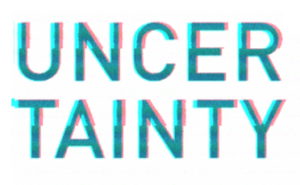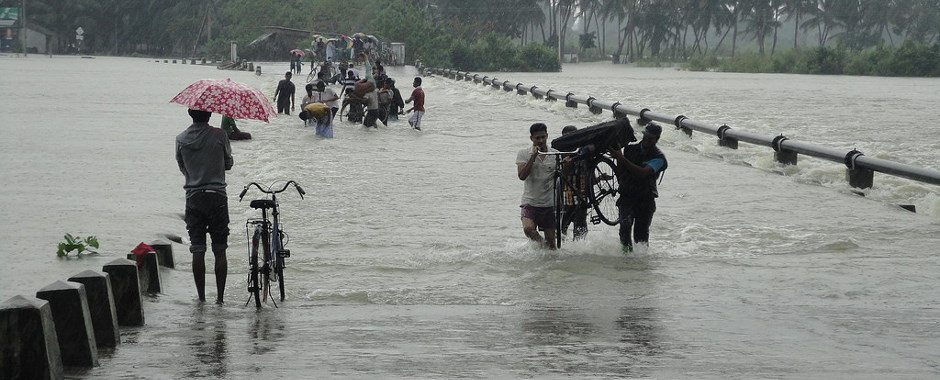by Irene Guijt, Head of Research and Publishing at Oxfam Great Britain
Uncertainty is a given in Oxfam. Each day brings new concerns, unexpected twists in relationships and the rollercoasters of dynamic contexts. We adjust out of necessity. But how explicitly do we build uncertainty into our work? And how do we not get paralysed by it, given the stress it brings?
Over the summer, I grabbed the unique opportunity to think about ‘uncertainty’ at the Politics of Uncertainty Conference. It was a fascinating journey into ideas, experiences and thought experiments with 97 academics and two others like me in the world of practice. Some moments got rather head-scratchingly abstract, like when we were asked ‘when is infrastructure?’ or ‘what’s worse than wrong? (Answer: neglected knowns). Yet examples were as concrete as they come: Ebola outbreaks, banking meltdowns, autonomous cars, open source seed production, nuclear accidents, climate change …
Triggered by examples from technology infrastructure, regulatory environment and cities, discussions zoomed in on how to feel at home with the inevitability of uncertainties. Some uncertainties are good, others are potentially catastrophic, some can be described while others never known. People in the control rooms of critical infrastructure are often quite clear and comfortable about the uncertainties with which they operate, but that’s not necessarily the case for those making investment or policy decisions. So what can be done to feel at home with uncertainty?
- Being aware of uncertainty. Uncertainty is not one notion or phenomenon: there’s an entire ecosystem of types and uncertainties that take place at timescales of day, year or decade. Being aware about the kinds of uncertainty you’re dealing with is as important as being clear about which uncertainties are being ignored. Are we dealing with long timeframe uncertainties of climate change impacts, the annual vagaries of farming, or the everyday uncertainties of where violence will erupt? Who is living with which uncertainty, and which uncertainties can we live with or not?
- Talking about uncertainty. Seeing the diverse types of uncertainty helps one to talk about it. It’s not about a single distinction between full prediction and being clueless. Some aspects of the world may be indeterminate, for example when the principle of fairness is agreed in a collaboration but cannot be measured. What part of the context or implementation or impact is uncertain – what is knowable or unknowable or what are the known unknowns? (I regularly thought, during the event, about related discussions on how we understand complexity.)
- Acting despite uncertainty. Knowledge about uncertainties needs to mesh with options for action. Ignorance, not knowing, isn’t necessarily bad in itself. But it is when it is covered up. So thinking about errors can help here. What kinds of errors are possible, likely, inevitable – and which ones must be avoided at all costs? Under what conditions can known processes break down? Some uncertainties only become visible when infrastructure stops working as it should. There’s a balance to strike between making critical assumptions explicit and accepting the inevitability of surprise.
- Going public on uncertainty. Uncertainty is uncomfortable. Being frank about what isn’t known is generally not valued or rewarded unless we’re talking about ‘innovation’. Aid programmes require contractual deliverables, with rare exceptions that allow their adaptive management. The politics about being explicit about uncertainty depends on context. The uncertainty of urban development is seen as an opportunity for experimentation and citizen engagement. But when it comes to crises, such as the mad cow disease outbreak in the 1990s, the uncertainty that was embraced behind the closed doors of policy makers was denied in public fora.
How can Oxfam deal with uncertainty?
Turning to my own workplace, Oxfam ‘does’ uncertainty on a daily basis. But we could do it more intentionally. This includes not trying to close down uncertainty too soon, being clear about where we can offer no guarantees. Oxfam is rethinking its next ten-year strategy, an ideal opportunity to factor in uncertainties. Here’s my three questions we should ask on how uncertainty affects our work.
- Are we clear about what kinds of uncertainties we deal with and what level of certainty can be promised? We can’t be uncertain around fraud detection or safeguarding. Yet we must accept relatively uncertain paths of campaigning on tax reform or shifting social norms around gender-based violence. Working in alliance raises further questions on thinking through and dealing with uncertainties.
- How can we communicate what uncertainties we are accepting and what ones we have mitigated against? Not an easy one, given the value attached to contracted deliverables and the obsessive measurement disorder common in international development. Measurability gives the illusion of certainty, when in some contexts judgement may matter more.
- What ways do we have to acknowledge and navigate uncertainties? And are they good enough? Each of Oxfam’s main areas of work have processes to manage some of the uncertainties and keep work feasible, relevant, accountable and safe.
-
- Humanitarian crises are arenas of deepest uncertainties. When, how many, where, whose needs – these questions unfold with a daily dynamic. Processes to manage these include trends analysis to spot creeping crises and ticking timebombs, categorising new acute crises despite the many uncertainties of on-the-ground information, tracking where improvements are needed, and daily stocktakes of developments and needs.
- On-ground change efforts include gender-transformative agribusiness investments, water and sanitation in fragile contexts, and climate adaptation for farmers. Theories of change and regular stocktake of changes keep outcomes feasible and ways of working effective. Innovation with intentional learning efforts should reduce uncertainties over time.
- Campaigning on issues like easing the unpaid care burden, essential services, or fair wages in value chains, requires a long term game plan. It’s not hard to make visible unacceptable inequalities and propose alternatives but the rocky road to change asks for constant revisiting of goals, tactics and the underlying evidence base. Learning across influencing efforts can only reduce some of the inherent uncertainties of long-term influencing.
A mind-boggling universe of uncertainties beckons, and with it the temptation to reduce them through a swamp of risk management processes. For those weary of uncertainty, the discussions also stressed we should be wary of certainty. To paraphrase Emery Roe’s pragmatic words: Uncertainty is a great starting point for further analysis of ways in which it can be managed. Uncertainty can convey information. It can be identified, categorized, bounded by its impact on a set of specified conditions which have been identified as potential precursors to events and failures that must never happen.
About the author
Irene Guijt is Head of Research and Publishing at Oxfam Great Britain.
This article is one of a series of blog posts reflecting on the STEPS symposium The Politics of Uncertainty: Practical Challenges for Transformative Action.
 Uncertainties can make it hard to plan ahead. But recognising them can help to reveal new questions and choices. What kinds of uncertainty are there, why do they matter for sustainability, and what ideas, approaches and methods can help us to respond to them?
Uncertainties can make it hard to plan ahead. But recognising them can help to reveal new questions and choices. What kinds of uncertainty are there, why do they matter for sustainability, and what ideas, approaches and methods can help us to respond to them?
Find out more about our theme for 2019 on our Uncertainty theme page.
